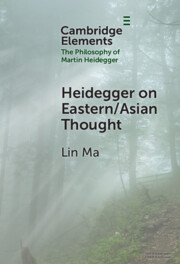About the series
A continual source of inspiration and controversy, the work of Martin Heidegger challenges thinkers across traditions and has opened up previously unexplored dimensions of Western thinking. The Elements in this series critically examine the continuing impact and promise of a thinker who transformed early twentieth-century phenomenology, spawned existentialism, gave new life to hermeneutics, celebrated the truthfulness of art and poetry, uncovered the hidden meaning of language and being, warned of “forgetting” being, and exposed the ominously deep roots of the essence of modern technology in Western metaphysics. Concise and structured overviews of Heidegger’s philosophy offer original and clarifying approaches to the major themes of Heidegger’s work, with fresh and provocative perspectives on its significance for contemporary thinking and existence.
Elements in this series
-

- Element
Heidegger on Thinking
-

- Element
Heidegger on Being Affected
About the editors
Filippo Casati is an Assistant Professor at Lehigh University, whose areas of specialization are Heidegger and Wittgenstein. In addition to co-authoring articles with Graham Priest and Naoya Fujikawa, he has published an array of articles in such venues as The British Journal for the History of Philosophy, Synthese, Logic et Analyse, Philosophia, and Philosophy Compass. He is the author of Heidegger and the Contradiction of Being (Routledge) and, with Daniel O. Dahlstrom, he edited Heidegger on logic (Cambridge University Press).
Daniel O. Dahlstrom, John R. Silber Professor of Philosophy at Boston University, has edited nineteen volumes, translated Mendelssohn, Schiller, Hegel, Husserl, Heidegger, and Landmann-Kalischer, and authored Heidegger’s Concept of Truth (2001), The Heidegger Dictionary (2013; second edition, 2023), Identity, Authenticity, and Humility (2017) and over 175 essays, principally on 18th-20th century German philosophy. With Filippo Casati, he edited Heidegger on Logic (Cambridge University Press).



